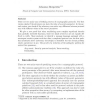Free Online Productivity Tools
i2Speak
i2Symbol
i2OCR
iTex2Img
iWeb2Print
iWeb2Shot
i2Type
iPdf2Split
iPdf2Merge
i2Bopomofo
i2Arabic
i2Style
i2Image
i2PDF
iLatex2Rtf
Sci2ools
111
click to vote
ENTCS
2006
2006
Static Equivalence is Harder than Knowledge
There are two main ways of defining secrecy of cryptographic protocols. The first version checks if the adversary can learn the value of a secret parameter. In the second version, one checks if the adversary can notice any difference between protocol runs with different values of the secret parameter. We give a new proof that when considering more complex equational theories than partially invertible functions, these two kinds of secrecy are not equally difficult to verify. More precisely, we identify a message language equipped with a convergent rewrite system such that after a completed protocol run, the first problem mentioned above (adversary knowledge) is decidable but the second problem (static equivalence) is not. The proof is by reduction of the ambiguity problem for context-free grammars. Key words: Security protocol analysis, Term rewriting, Decidability.
Related Content
| Added | 12 Dec 2010 |
| Updated | 12 Dec 2010 |
| Type | Journal |
| Year | 2006 |
| Where | ENTCS |
| Authors | Johannes Borgström |
Comments (0)

